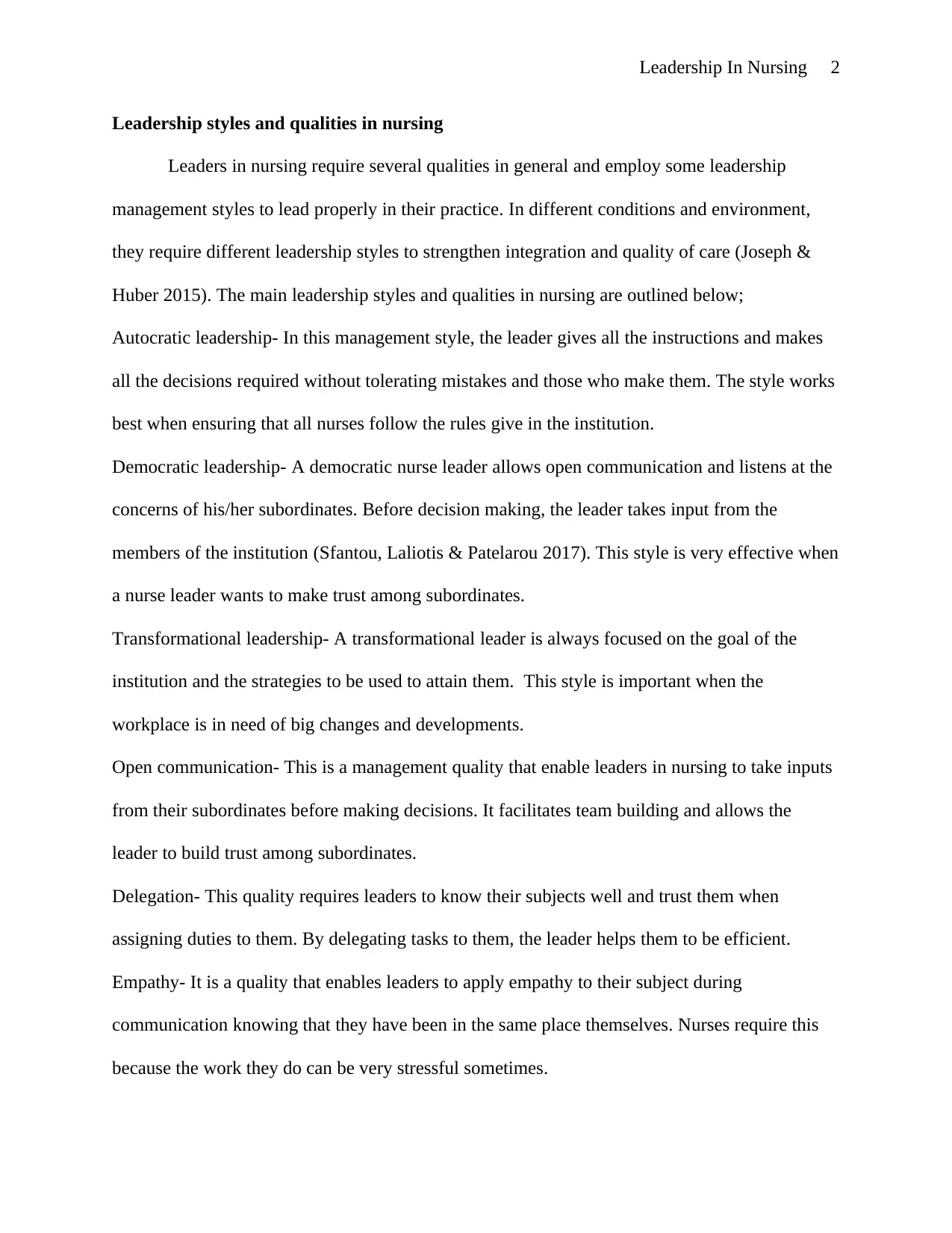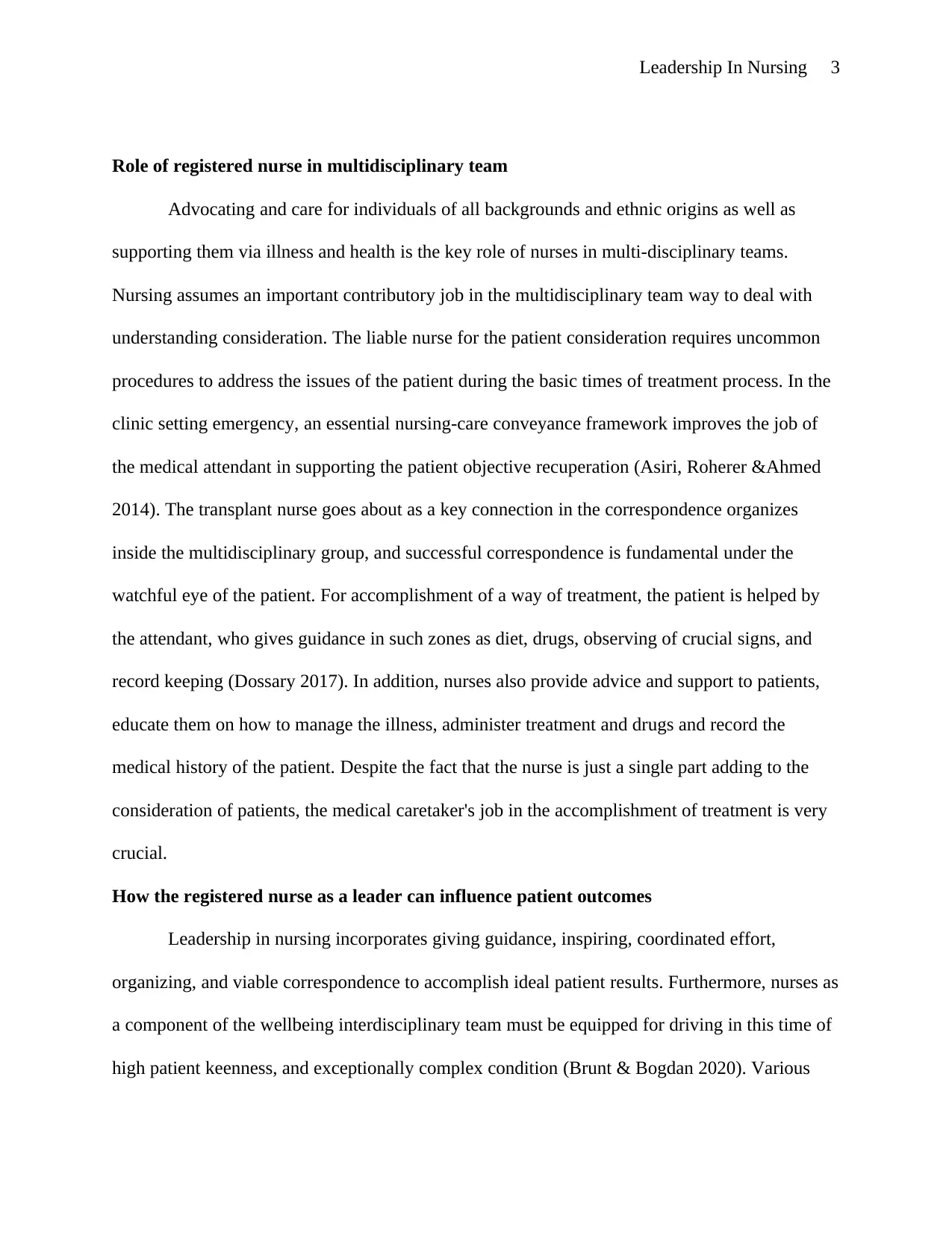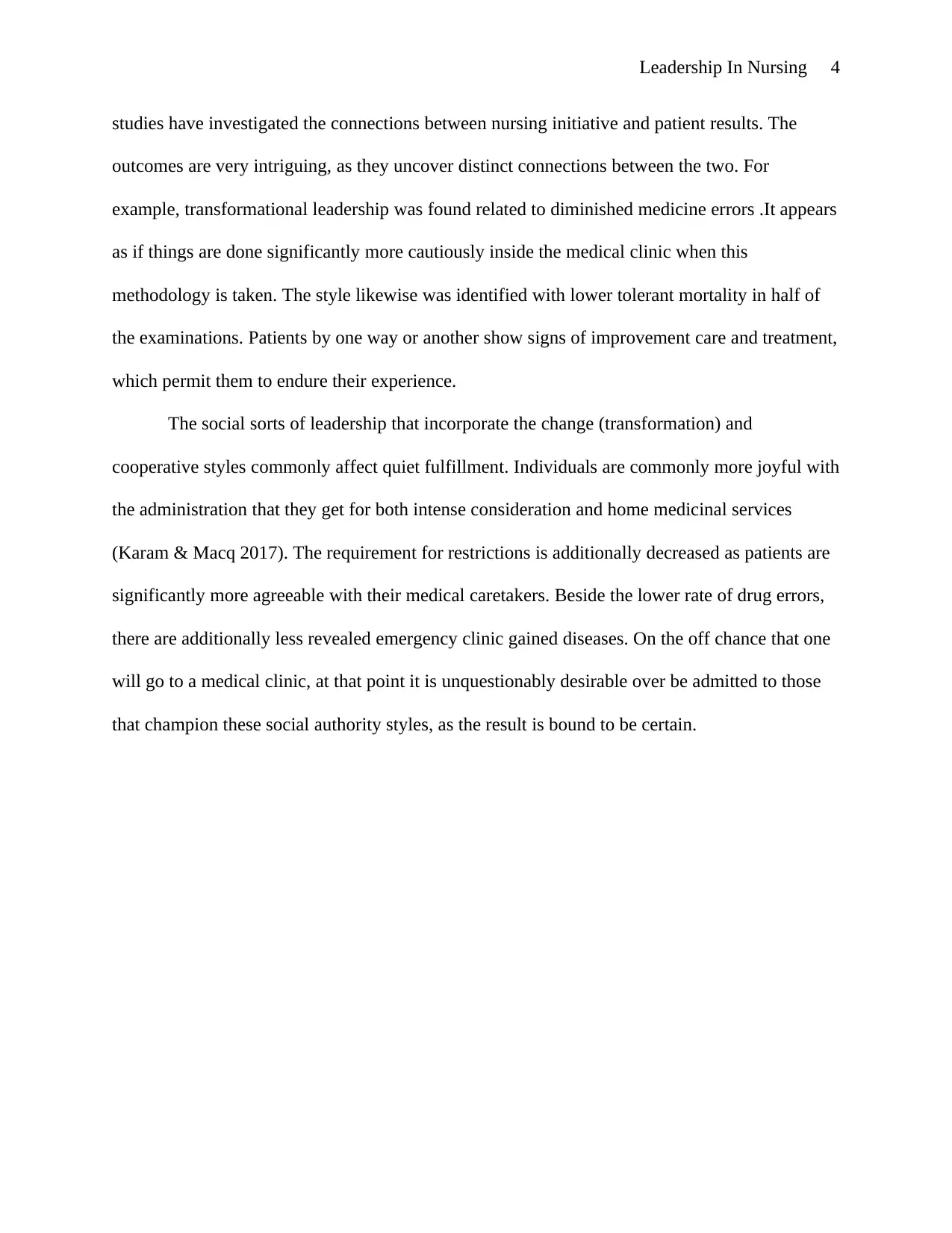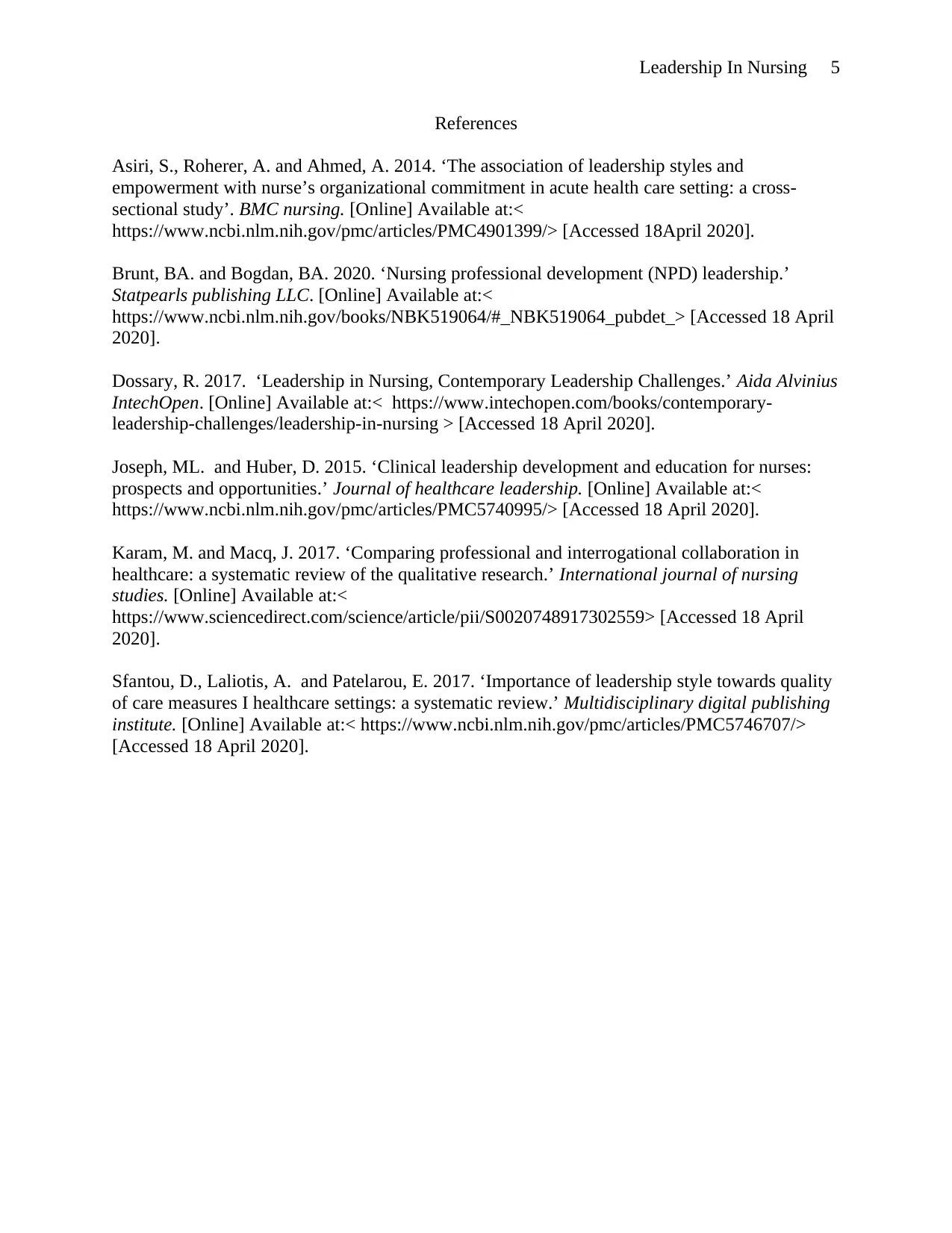Leadership in Nursing: Styles, Roles, and Outcomes
VerifiedAdded on 2022/07/28
|5
|1163
|14
Essay
AI Summary
This essay delves into the multifaceted world of leadership in nursing, exploring various leadership styles such as autocratic, democratic, and transformational approaches. It highlights the essential qualities of effective nurse leaders, including open communication, delegation, and empathy. The essay examines the crucial role of registered nurses within multidisciplinary teams, emphasizing their advocacy for patients and contribution to patient care. Furthermore, it investigates how leadership influences patient outcomes, citing research that links specific leadership styles to decreased medication errors, reduced mortality rates, and improved patient satisfaction. The essay concludes by underscoring the significance of strong leadership in fostering positive healthcare environments and achieving optimal patient results.

Leadership In Nursing 1
LEADERSHIP IN NURSING
Student’s Name
Institutional Affiliation
Date
LEADERSHIP IN NURSING
Student’s Name
Institutional Affiliation
Date
Paraphrase This Document
Need a fresh take? Get an instant paraphrase of this document with our AI Paraphraser

Leadership In Nursing 2
Leadership styles and qualities in nursing
Leaders in nursing require several qualities in general and employ some leadership
management styles to lead properly in their practice. In different conditions and environment,
they require different leadership styles to strengthen integration and quality of care (Joseph &
Huber 2015). The main leadership styles and qualities in nursing are outlined below;
Autocratic leadership- In this management style, the leader gives all the instructions and makes
all the decisions required without tolerating mistakes and those who make them. The style works
best when ensuring that all nurses follow the rules give in the institution.
Democratic leadership- A democratic nurse leader allows open communication and listens at the
concerns of his/her subordinates. Before decision making, the leader takes input from the
members of the institution (Sfantou, Laliotis & Patelarou 2017). This style is very effective when
a nurse leader wants to make trust among subordinates.
Transformational leadership- A transformational leader is always focused on the goal of the
institution and the strategies to be used to attain them. This style is important when the
workplace is in need of big changes and developments.
Open communication- This is a management quality that enable leaders in nursing to take inputs
from their subordinates before making decisions. It facilitates team building and allows the
leader to build trust among subordinates.
Delegation- This quality requires leaders to know their subjects well and trust them when
assigning duties to them. By delegating tasks to them, the leader helps them to be efficient.
Empathy- It is a quality that enables leaders to apply empathy to their subject during
communication knowing that they have been in the same place themselves. Nurses require this
because the work they do can be very stressful sometimes.
Leadership styles and qualities in nursing
Leaders in nursing require several qualities in general and employ some leadership
management styles to lead properly in their practice. In different conditions and environment,
they require different leadership styles to strengthen integration and quality of care (Joseph &
Huber 2015). The main leadership styles and qualities in nursing are outlined below;
Autocratic leadership- In this management style, the leader gives all the instructions and makes
all the decisions required without tolerating mistakes and those who make them. The style works
best when ensuring that all nurses follow the rules give in the institution.
Democratic leadership- A democratic nurse leader allows open communication and listens at the
concerns of his/her subordinates. Before decision making, the leader takes input from the
members of the institution (Sfantou, Laliotis & Patelarou 2017). This style is very effective when
a nurse leader wants to make trust among subordinates.
Transformational leadership- A transformational leader is always focused on the goal of the
institution and the strategies to be used to attain them. This style is important when the
workplace is in need of big changes and developments.
Open communication- This is a management quality that enable leaders in nursing to take inputs
from their subordinates before making decisions. It facilitates team building and allows the
leader to build trust among subordinates.
Delegation- This quality requires leaders to know their subjects well and trust them when
assigning duties to them. By delegating tasks to them, the leader helps them to be efficient.
Empathy- It is a quality that enables leaders to apply empathy to their subject during
communication knowing that they have been in the same place themselves. Nurses require this
because the work they do can be very stressful sometimes.

Leadership In Nursing 3
Role of registered nurse in multidisciplinary team
Advocating and care for individuals of all backgrounds and ethnic origins as well as
supporting them via illness and health is the key role of nurses in multi-disciplinary teams.
Nursing assumes an important contributory job in the multidisciplinary team way to deal with
understanding consideration. The liable nurse for the patient consideration requires uncommon
procedures to address the issues of the patient during the basic times of treatment process. In the
clinic setting emergency, an essential nursing-care conveyance framework improves the job of
the medical attendant in supporting the patient objective recuperation (Asiri, Roherer &Ahmed
2014). The transplant nurse goes about as a key connection in the correspondence organizes
inside the multidisciplinary group, and successful correspondence is fundamental under the
watchful eye of the patient. For accomplishment of a way of treatment, the patient is helped by
the attendant, who gives guidance in such zones as diet, drugs, observing of crucial signs, and
record keeping (Dossary 2017). In addition, nurses also provide advice and support to patients,
educate them on how to manage the illness, administer treatment and drugs and record the
medical history of the patient. Despite the fact that the nurse is just a single part adding to the
consideration of patients, the medical caretaker's job in the accomplishment of treatment is very
crucial.
How the registered nurse as a leader can influence patient outcomes
Leadership in nursing incorporates giving guidance, inspiring, coordinated effort,
organizing, and viable correspondence to accomplish ideal patient results. Furthermore, nurses as
a component of the wellbeing interdisciplinary team must be equipped for driving in this time of
high patient keenness, and exceptionally complex condition (Brunt & Bogdan 2020). Various
Role of registered nurse in multidisciplinary team
Advocating and care for individuals of all backgrounds and ethnic origins as well as
supporting them via illness and health is the key role of nurses in multi-disciplinary teams.
Nursing assumes an important contributory job in the multidisciplinary team way to deal with
understanding consideration. The liable nurse for the patient consideration requires uncommon
procedures to address the issues of the patient during the basic times of treatment process. In the
clinic setting emergency, an essential nursing-care conveyance framework improves the job of
the medical attendant in supporting the patient objective recuperation (Asiri, Roherer &Ahmed
2014). The transplant nurse goes about as a key connection in the correspondence organizes
inside the multidisciplinary group, and successful correspondence is fundamental under the
watchful eye of the patient. For accomplishment of a way of treatment, the patient is helped by
the attendant, who gives guidance in such zones as diet, drugs, observing of crucial signs, and
record keeping (Dossary 2017). In addition, nurses also provide advice and support to patients,
educate them on how to manage the illness, administer treatment and drugs and record the
medical history of the patient. Despite the fact that the nurse is just a single part adding to the
consideration of patients, the medical caretaker's job in the accomplishment of treatment is very
crucial.
How the registered nurse as a leader can influence patient outcomes
Leadership in nursing incorporates giving guidance, inspiring, coordinated effort,
organizing, and viable correspondence to accomplish ideal patient results. Furthermore, nurses as
a component of the wellbeing interdisciplinary team must be equipped for driving in this time of
high patient keenness, and exceptionally complex condition (Brunt & Bogdan 2020). Various
⊘ This is a preview!⊘
Do you want full access?
Subscribe today to unlock all pages.

Trusted by 1+ million students worldwide

Leadership In Nursing 4
studies have investigated the connections between nursing initiative and patient results. The
outcomes are very intriguing, as they uncover distinct connections between the two. For
example, transformational leadership was found related to diminished medicine errors .It appears
as if things are done significantly more cautiously inside the medical clinic when this
methodology is taken. The style likewise was identified with lower tolerant mortality in half of
the examinations. Patients by one way or another show signs of improvement care and treatment,
which permit them to endure their experience.
The social sorts of leadership that incorporate the change (transformation) and
cooperative styles commonly affect quiet fulfillment. Individuals are commonly more joyful with
the administration that they get for both intense consideration and home medicinal services
(Karam & Macq 2017). The requirement for restrictions is additionally decreased as patients are
significantly more agreeable with their medical caretakers. Beside the lower rate of drug errors,
there are additionally less revealed emergency clinic gained diseases. On the off chance that one
will go to a medical clinic, at that point it is unquestionably desirable over be admitted to those
that champion these social authority styles, as the result is bound to be certain.
studies have investigated the connections between nursing initiative and patient results. The
outcomes are very intriguing, as they uncover distinct connections between the two. For
example, transformational leadership was found related to diminished medicine errors .It appears
as if things are done significantly more cautiously inside the medical clinic when this
methodology is taken. The style likewise was identified with lower tolerant mortality in half of
the examinations. Patients by one way or another show signs of improvement care and treatment,
which permit them to endure their experience.
The social sorts of leadership that incorporate the change (transformation) and
cooperative styles commonly affect quiet fulfillment. Individuals are commonly more joyful with
the administration that they get for both intense consideration and home medicinal services
(Karam & Macq 2017). The requirement for restrictions is additionally decreased as patients are
significantly more agreeable with their medical caretakers. Beside the lower rate of drug errors,
there are additionally less revealed emergency clinic gained diseases. On the off chance that one
will go to a medical clinic, at that point it is unquestionably desirable over be admitted to those
that champion these social authority styles, as the result is bound to be certain.
Paraphrase This Document
Need a fresh take? Get an instant paraphrase of this document with our AI Paraphraser

Leadership In Nursing 5
References
Asiri, S., Roherer, A. and Ahmed, A. 2014. ‘The association of leadership styles and
empowerment with nurse’s organizational commitment in acute health care setting: a cross-
sectional study’. BMC nursing. [Online] Available at:<
https://www.ncbi.nlm.nih.gov/pmc/articles/PMC4901399/> [Accessed 18April 2020].
Brunt, BA. and Bogdan, BA. 2020. ‘Nursing professional development (NPD) leadership.’
Statpearls publishing LLC. [Online] Available at:<
https://www.ncbi.nlm.nih.gov/books/NBK519064/#_NBK519064_pubdet_> [Accessed 18 April
2020].
Dossary, R. 2017. ‘Leadership in Nursing, Contemporary Leadership Challenges.’ Aida Alvinius
IntechOpen. [Online] Available at:< https://www.intechopen.com/books/contemporary-
leadership-challenges/leadership-in-nursing > [Accessed 18 April 2020].
Joseph, ML. and Huber, D. 2015. ‘Clinical leadership development and education for nurses:
prospects and opportunities.’ Journal of healthcare leadership. [Online] Available at:<
https://www.ncbi.nlm.nih.gov/pmc/articles/PMC5740995/> [Accessed 18 April 2020].
Karam, M. and Macq, J. 2017. ‘Comparing professional and interrogational collaboration in
healthcare: a systematic review of the qualitative research.’ International journal of nursing
studies. [Online] Available at:<
https://www.sciencedirect.com/science/article/pii/S0020748917302559> [Accessed 18 April
2020].
Sfantou, D., Laliotis, A. and Patelarou, E. 2017. ‘Importance of leadership style towards quality
of care measures I healthcare settings: a systematic review.’ Multidisciplinary digital publishing
institute. [Online] Available at:< https://www.ncbi.nlm.nih.gov/pmc/articles/PMC5746707/>
[Accessed 18 April 2020].
References
Asiri, S., Roherer, A. and Ahmed, A. 2014. ‘The association of leadership styles and
empowerment with nurse’s organizational commitment in acute health care setting: a cross-
sectional study’. BMC nursing. [Online] Available at:<
https://www.ncbi.nlm.nih.gov/pmc/articles/PMC4901399/> [Accessed 18April 2020].
Brunt, BA. and Bogdan, BA. 2020. ‘Nursing professional development (NPD) leadership.’
Statpearls publishing LLC. [Online] Available at:<
https://www.ncbi.nlm.nih.gov/books/NBK519064/#_NBK519064_pubdet_> [Accessed 18 April
2020].
Dossary, R. 2017. ‘Leadership in Nursing, Contemporary Leadership Challenges.’ Aida Alvinius
IntechOpen. [Online] Available at:< https://www.intechopen.com/books/contemporary-
leadership-challenges/leadership-in-nursing > [Accessed 18 April 2020].
Joseph, ML. and Huber, D. 2015. ‘Clinical leadership development and education for nurses:
prospects and opportunities.’ Journal of healthcare leadership. [Online] Available at:<
https://www.ncbi.nlm.nih.gov/pmc/articles/PMC5740995/> [Accessed 18 April 2020].
Karam, M. and Macq, J. 2017. ‘Comparing professional and interrogational collaboration in
healthcare: a systematic review of the qualitative research.’ International journal of nursing
studies. [Online] Available at:<
https://www.sciencedirect.com/science/article/pii/S0020748917302559> [Accessed 18 April
2020].
Sfantou, D., Laliotis, A. and Patelarou, E. 2017. ‘Importance of leadership style towards quality
of care measures I healthcare settings: a systematic review.’ Multidisciplinary digital publishing
institute. [Online] Available at:< https://www.ncbi.nlm.nih.gov/pmc/articles/PMC5746707/>
[Accessed 18 April 2020].
1 out of 5
Related Documents
Your All-in-One AI-Powered Toolkit for Academic Success.
+13062052269
info@desklib.com
Available 24*7 on WhatsApp / Email
![[object Object]](/_next/static/media/star-bottom.7253800d.svg)
Unlock your academic potential
Copyright © 2020–2026 A2Z Services. All Rights Reserved. Developed and managed by ZUCOL.




